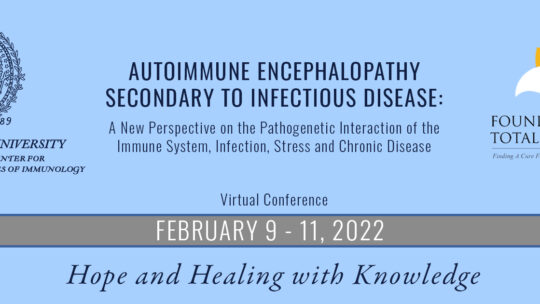
PANDAS is Autoimmune Encephalitis
"Pediatric Autoimmune Neuropsychiatric Disorder Associated with Streptococcal infection or PANDAS can also be called post-streptococcal autoimmune basal ganglia...

"Pediatric Autoimmune Neuropsychiatric Disorder Associated with Streptococcal infection or PANDAS can also be called post-streptococcal autoimmune basal ganglia...

Register to Watch Virtually Conference videos are available until May. Please note, if you are having problems accessing the conference, please first check your spam folder for an email...

The Seattle Times By Leah Penney, Mental Health Perspectives guest columnist “A few weeks after my 6th birthday, I went to bed one night a happy, healthy child, and I...

What would you do if you thought the government was coming to take your child? Protecting Your Child explains the child protection system—what it is, the way it works, and how to navigate your way...

One of the primary symptoms of PANS is Severe Eating Restriction. Over 50% of PANS patients will have non-life threatening eating restrictions but more severe than picky eating. While 17% will...

We know there is no parenting playbook; there certainly isn’t one when you add PANS/PANDAS to the mix. As parents, we are often second-guessing our decisions. So, as you read...
Diagnostics, Differential Diagnostics And The Treatment Of Pandas Syndrome – Case Description Mukhtorjonova Khusnigul Nodirbekovna, Tukhtabayeva Kamila Abrarovna, Tashkent Padiatric Medical Institute. World Bulletin of Public Health (WBPH). Volume-6, January 2022. ISSN: 2749-3644
This article gives a case of PANDAS syndrome in an 11-year-old boy. The
course and clinic of the disease in the form of prolonged sneezing attacks
made it difficult to diagnose this syndrome. Conducting biochemical blood
tests, daily video electroencephalographic monitoring (EEG monitoring) and
magnetic resonance imaging of the brain (MRI) allowed to determine the
condition. The appointment of antibiotic therapy and intravenous
administration of immunoglobulin led to remission of the disease. It is
necessary to conduct further studies to determine the effectiveness of the
above drugs for this syndrome.

Attention Parents and Guardians of children with PANS/PANDAS! The University at Buffalo occupational therapy program is conducting a study of caregiver experiences and stress among parents/guardians...

Examining possible root causes of Obsessive-Compulsive Disorder. Psychology Times by Odelya Gertel Kraybill Ph.D. Key points OCD can be rooted in immune response. OCD can be triggered by infections...
McHugh A, Chan A, Herrera C, Park JM, Balboni I, Gerstbacher D, Hsu JJ, Lee T, Thienemann M, Frankovich J. Profiling Behavioral and Psychological Symptoms in Children undergoing treatment for Spondyloarthritis and Polyarthritis. J Rheumatol. 2022 Feb 1:jrheum.210489. doi: 10.3899/jrheum.210489. Epub ahead of print. PMID: 35105715.
Results: There were 111 patients and 1753 healthy controls (HCs). Compared to HCs, patients with SpA or PolyA had worse total competence and internalizing scores. Higher cJADAS10 scores were associated with worse total competence, worse internalizing, and higher total problems scores. Most of these differences reached statistical significance (P < 0.01). Self-harm/suicidality was almost 4-fold higher in patients with PolyA than HCs (OR 3.6, 95% CI 1.3-9.6, P = 0.011).
Conclusion: Our study shows that patients with SpA and PolyA with more active disease have worse psychological functioning in activities, school, and social arenas, and more internalized emotional disturbances, suggesting the need for regular mental health screening by rheumatologists.